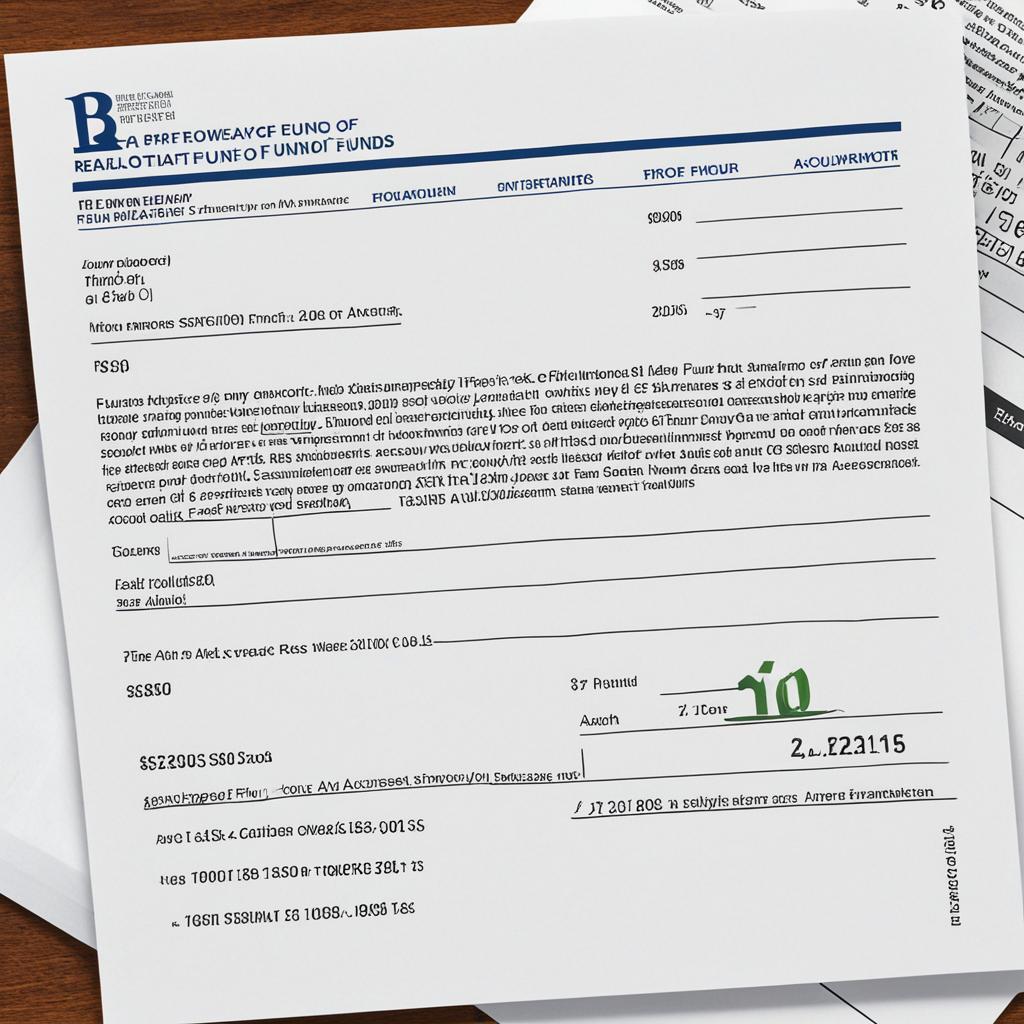Hello, I’m here to shed some light on the concept of proof of funds in real estate transactions. As a journalist specializing in the real estate industry, I understand the importance of this document for both buyers and sellers.
Proof of funds is a document that serves as evidence of a person or entity’s available funds for a real estate transaction. It showcases the financial capacity of the buyer to cover the various costs associated with purchasing a home, such as the down payment, escrow, and closing costs.
For sellers, proof of funds offers reassurance that the potential buyer has the necessary finances to complete the transaction. It provides confidence and trust that the buyer is serious about the purchase. Additionally, knowing that the buyer has the means to cover the expenses can help avoid potential complications during the closing process.
Whether you’re a buyer looking to secure your dream home or a seller seeking a smooth and successful transaction, understanding proof of funds is crucial. In the following sections, I will delve deeper into the various aspects of this topic, including the types of documents that qualify as proof of funds, the difference between proof of funds and preapproval letters, and the reasons why this document is essential in real estate transactions.
Key Takeaways:
- Proof of funds is a document that provides evidence of a person or entity’s available funds for a real estate transaction.
- It showcases the financial capacity of the buyer to cover the costs associated with purchasing a home.
- For sellers, proof of funds offers reassurance and minimizes the risk of complications during the closing process.
- Understanding proof of funds is crucial for both buyers and sellers in real estate transactions.
Understanding Proof of Funds
Proof of funds is a crucial document in real estate transactions that demonstrates the financial capacity of a buyer to cover the purchase costs, including the down payment, escrow, and closing costs. It serves as evidence that the buyer has the necessary funds available to proceed with the home purchase.
When it comes to buying a home, proof of funds provides assurance to sellers that the buyer has the financial means to complete the transaction. It validates the buyer’s ability to cover the expenses associated with the purchase, giving sellers confidence in the buyer’s commitment and capability.
Imagine you’re a seller receiving multiple offers for your home. How do you choose the most reliable buyer? Proof of funds can be the differentiating factor, as it shows that the buyer has the financial readiness to close the deal.
Let’s take a closer look at the essential aspects of proof of funds in real estate transactions:
- The purcha
Types of Documents for Proof of Funds
When it comes to proving your financial capacity in a real estate transaction, there are several types of documents that can serve as proof of funds. These documents provide tangible evidence of the amount of accessible or liquid funds available to you. It’s important to note that the funds must be readily available for use in the purchase.
Here are the types of documents commonly used as proof of funds:
- Bank Statement: A bank statement is an official document that shows the balance and transactions of your bank account. It provides a clear snapshot of your available funds and is widely accepted as proof of funds in real estate transactions.
- Certified Financial Statement: A certified financial statement is a comprehensive report prepared by a certified public accountant (CPA) or a licensed financial professional. It includes detailed information about your financial status, including your assets, liabilities, and net worth. This statement can be used to demonstrate your financial capacity for a real estate transaction.
- Letter from a Bank or Financial Institution: A letter from a bank or financial institution is a written document that confirms the exact amount of liquid funds you have available. This letter is typically issued on the bank’s letterhead and bears the signature and contact information of an authorized bank representative. It provides a formal declaration of your financial capacity and can be used as proof of funds.
When using any of these documents as proof of funds, it’s crucial to ensure that the funds are easily accessible and can be used for the specific purpose of the real estate transaction. This means that the funds must be in the form of liquid assets, such as cash in a bank account, money market accounts, stocks, bonds, or certificates of deposit.
Having the right documentation to support your proof of funds can greatly enhance your credibility as a buyer and give the seller confidence that you have the financial means to complete the transaction. It’s always advisable to consult with a real estate professional or attorney to understand the specific requirements and guidelines for providing proof of funds in your real estate transaction.
Difference Between Proof of Funds and Preapproval Letter
When it comes to buying a home, it’s important to understand the difference between a proof of funds letter and a preapproval letter. While both documents are related to the financial aspect of a real estate transaction, they serve different purposes.
A preapproval letter is typically issued by a lender and states that they are willing to provide a buyer with a loan for a specific amount. It demonstrates to sellers that the buyer has been vetted by a lender and has the financial capacity to secure a mortgage.
On the other hand, a proof of funds letter shows that a buyer has the necessary funds available to cover the costs associated with purchasing a home. This includes expenses such as the down payment, closing costs, and any other financial obligations that might arise during the real estate transaction.
While a preapproval letter is required for buyers seeking a mortgage, a proof of funds letter is essential for both cash buyers and those seeking financing. It provides sellers with confidence that the buyer has the financial means to follow through with the purchase.
In summary, a preapproval letter gives assurance to sellers that a buyer has the backing of a lender, while a proof of funds letter demonstrates that the buyer has the necessary funds accessible to complete the transaction.
“A preapproval letter signifies a lender’s willingness to provide a loan, while a proof of funds letter shows that a buyer has the financial capability to cover the costs of a home purchase.”
| Proof of Funds Letter | Preapproval Letter |
|---|---|
| Shows availability of funds | Confirms loan preapproval |
| Required for cash buyers | Required for buyers seeking a mortgage |
| Provides assurance to sellers | Provides assurance to sellers and lenders |
| Includes information on available funds | States the loan amount buyer is preapproved for |
Qualifying Funds for Proof of Funds
When it comes to proving your financial capacity for a real estate transaction, not all assets are considered qualifying funds for proof of funds. Only liquid assets can be used as proof of funds, meaning assets that can be easily accessed and converted into cash. Here are some examples of qualifying funds:
- Cash in a bank account
- Money market accounts
- Stocks
- Bonds
- Certificates of deposit (CDs)
These assets demonstrate your ability to cover the costs associated with purchasing a home, such as the down payment, closing costs, and other expenses. They provide the necessary assurance to sellers that you have the financial means to complete the transaction.
On the other hand, non-liquid assets such as real estate, collectibles, and life insurance policies do not qualify as proof of funds. While they may hold value, they cannot be easily converted to cash within a reasonable timeframe, making them unsuitable for demonstrating immediate purchasing power.
It’s important to note that different lenders or sellers may have specific requirements or preferences regarding the acceptable forms of proof of funds. It’s essential to consult with your real estate agent or financial advisor to ensure that you meet the specific requirements of your situation.
Example:
“As a buyer, it’s crucial to ensure that the funds you present as proof of funds are easily accessible and readily available. Liquid assets like cash in a bank account or investments such as stocks and bonds demonstrate financial stability and reassure sellers that you have the means to complete the purchase. Non-liquid assets may hold value but cannot be easily converted to cash, making them unsuitable for proof of funds.”
Comparison Table: Liquid vs. Non-Liquid Assets for Proof of Funds
| Liquid Assets | Non-Liquid Assets |
|---|---|
| Cash in a bank account | Real estate |
| Money market accounts | Collectibles |
| Stocks | Life insurance policies |
| Bonds | |
| Certificates of deposit (CDs) |
Having a clear understanding of the qualifying funds for proof of funds is essential when preparing for a real estate transaction. By ensuring you have the right assets and documentation in place, you can confidently demonstrate your financial capacity to sellers and proceed with a successful purchase.
Reasons for Needing Proof of Funds in Real Estate
Proof of funds is a critical requirement in various real estate transactions. Whether you’re considering a cash purchase or opting for a mortgage, having evidence of your financial capacity is essential. Here are a few reasons why proof of funds may be necessary:
Cash Purchase
When you plan to make a cash purchase, you’ll need to demonstrate that you have the necessary funds to buy the property outright. Sellers want assurance that the transaction can be completed smoothly without relying on external financing. Providing proof of funds is an excellent way to instill confidence in the seller and increase the chances of your offer being accepted.
Mortgage Purchase
If you’re considering a mortgage to finance your home purchase, both the lender and the seller will require evidence of your financial capability. In addition to the down payment, you’ll also need to cover closing costs. Providing proof of funds shows that you have enough money in reserve to meet these financial obligations, which reassures the lender and seller of your ability to fulfill your commitments.
Now that we understand the reasons for needing proof of funds, let’s take a closer look at how you can obtain the necessary documentation.

What Should a Proof of Funds Letter Include
A proof of funds letter is a crucial document in real estate transactions that provides evidence of a buyer’s financial capacity to cover the necessary purchase costs. To ensure the letter is comprehensive and meets the requirements of the seller and lender, it should include the following information:
- Bank’s Name and Address: The proof of funds letter should clearly state the name and address of the bank or financial institution issuing the letter. This information helps establish the credibility and authenticity of the document.
- Official Bank Statement: The letter should include an official bank statement, either printed or obtained through the bank’s online platform. This statement serves as the primary evidence of the available funds in the buyer’s accounts.
- Total Balance of Funds: The letter should clearly state the total balance of funds available in the buyer’s accounts. This provides a comprehensive view of the buyer’s financial capacity.
- Balance of Funds in the Checking or Savings Account: In addition to the total balance, the proof of funds letter should specify the balance of funds specifically held in the checking or savings account. This helps the seller or lender understand the buyer’s liquidity and immediate accessibility to funds.
- Signature of an Authorized Bank Employee or Notary: The letter must bear the signature of an authorized bank employee or a notary. This ensures the document’s legitimacy and adds a layer of authenticity.
- Date when the Funds were in the Account: The proof of funds letter should clearly indicate the date when the funds reflected in the bank statement were in the account. This helps establish the availability and recentness of the funds.
By including these key elements in a proof of funds letter, buyers can provide clear and comprehensive evidence of their financial capacity to complete a real estate transaction, instilling confidence in sellers and lenders. It is essential to consult with a real estate attorney or agent to ensure the letter meets all legal requirements and addresses any specific concerns related to the proof of funds.
| Key Elements | Description |
|---|---|
| Bank’s Name and Address | Clearly state the name and address of the bank or financial institution issuing the letter. |
| Official Bank Statement | Include an official bank statement, either printed or obtained through the bank’s online platform. |
| Total Balance of Funds | Specify the total balance of funds available in the buyer’s accounts. |
| Balance of Funds in the Checking or Savings Account | Specify the balance of funds specifically held in the checking or savings account. |
| Signature of an Authorized Bank Employee or Notary | Bear the signature of an authorized bank employee or a notary. |
| Date when the Funds were in the Account | Indicate the date when the funds were in the account according to the bank statement. |
Obtaining a Proof of Funds Letter
When it comes to obtaining a proof of funds letter, there are a few important steps to follow. Consolidating your funds into a single bank account is crucial, especially if they are spread across multiple accounts. This consolidation ensures that your proof of funds accurately reflects your financial capacity.
Once your funds are consolidated, you can request a proof of funds letter from your bank or financial institution. This letter serves as documentation of the available funds you have for a real estate transaction. It provides confidence to sellers and lenders that you have the necessary financial means to cover the purchase costs.
When requesting a proof of funds letter, make sure to provide the necessary information to your bank or financial institution. This may include the account details, total balance, and any specific requirements outlined by the seller or lender. By providing accurate information, you can ensure that your proof of funds letter is valid and meets the expectations of all parties involved.
It is crucial to keep the information in your proof of funds letter secure. This letter contains sensitive financial information, and it should only be provided to authorized parties involved in the home buying process. Protecting your secure information helps safeguard against potential fraudulent activities and ensures a smooth and secure transaction.
Remember, the proof of funds letter is an essential component of the home buying process, providing evidence of your financial capacity. By obtaining this letter and following the necessary steps, you can demonstrate to sellers and lenders that you are a serious and qualified buyer.
Take a look at the example below for formatting and submitting a proof of funds letter:
| Proof of Funds Letter Example |
|---|
|
[Your Name] [Your Address] [City, State, ZIP] Date: [Date] [Bank’s Name] [Bank’s Address] [City, State, ZIP] Re: Proof of Funds Dear [Bank Contact],
|

In the next section, we will explore how proof of funds can be used for cash purchases in real estate.
Using Proof of Funds for Cash Purchases
When it comes to cash purchases in real estate, having a proof of funds letter is essential. This document serves as evidence to the seller that the buyer has the necessary funds to complete the transaction without relying on financing options. The proof of funds letter provides reassurance to the seller, highlighting the secure and straightforward nature of the cash purchase.
For sellers, knowing that the buyer has the financial means to purchase the property outright is crucial. It minimizes the risk of the transaction falling through due to lack of funds or financing issues. By verifying the availability of funds beforehand, sellers can proceed with confidence, ensuring a smooth and efficient transaction.
“The proof of funds letter provides reassurance to the seller, highlighting the secure and straightforward nature of the cash purchase.”
Buyers benefit from a proof of funds letter as well. It showcases their financial readiness to complete the purchase without any delay or uncertainty. This can strengthen their position when negotiating the price and terms of the transaction, as sellers often prefer cash buyers who can swiftly close the deal.
Validating the Funds for a Secure Transaction
One of the primary reasons for requiring proof of funds in cash purchases is to ensure a secure transaction. By verifying the availability of funds upfront, both parties can enter the transaction with peace of mind.
While cash purchases may reduce some of the complexities associated with financing, it is still essential to conduct due diligence. The proof of funds letter helps verify that the funds are genuine and readily accessible. This step safeguards against fraudulent or insufficient funds, protecting both the buyer and seller.
By utilizing a proof of funds letter, buyers and sellers can confidently proceed with the purchase, knowing that the financial aspect of the transaction is well-documented and secure.
An Illustration of a Secure Transaction
| Transaction Type | Description |
|---|---|
| Cash Purchase | A buyer presents a proof of funds letter to the seller, demonstrating the availability of funds to cover the entire purchase price. The seller, having verified the funds, agrees to proceed with the transaction. The buyer completes the purchase using their verified funds, ensuring a smooth and secure transaction. |
| Mortgage Purchase | A buyer provides a preapproval letter from a lender to demonstrate their eligibility for a mortgage loan. Alongside the preapproval letter, the buyer also presents a proof of funds letter to show that they have the necessary funds for the down payment and closing costs. The seller and lender review the documentation, assuring them of the buyer’s ability to finance the purchase. The buyer proceeds with financing the remaining portion of the purchase price, while utilizing their verified funds for the upfront costs, ensuring a secure transaction. |
By understanding the importance of a proof of funds letter in cash purchases, both buyers and sellers can engage in secure and confident real estate transactions. It streamlines the process, provides financial clarity, and ensures a smooth transfer of property ownership.
Importance of Proof of Funds for Mortgage Purchases
When it comes to mortgage purchases, having proof of funds is crucial for both the lender and the seller. This documentation shows that the buyer has the necessary funds available for the down payment and closing costs, instilling confidence in both parties and ensuring a smooth transaction.
For the lender, proof of funds provides reassurance that the buyer has the financial capacity to fulfill their mortgage obligations. It indicates that the buyer has sufficient funds to cover the down payment, which demonstrates their ability to contribute to the investment and decreases the lender’s risk.
Additionally, the seller also benefits from proof of funds in a mortgage purchase. It assures them that the buyer has the financial capability to complete the transaction and covers the necessary costs, such as closing costs. This knowledge helps the seller feel more secure about entering into a contract with the buyer.
Providing proof of funds in a mortgage purchase is essential because it:
- Confirms the buyer’s ability to cover the down payment
- Gives the lender assurance of the buyer’s financial capacity
- Offers peace of mind to the seller, minimizing the risk of a failed sale
By presenting proof of funds, buyers can enhance their credibility and increase their chances of having their mortgage purchase offer accepted. Sellers can feel more confident and comfortable in proceeding with the transaction, knowing that the buyer is financially prepared.
| Benefits of Proof of Funds for Mortgage Purchases: | |
|---|---|
| Confirms buyer’s financial capacity | Ensures secure and successful mortgage transactions |
| Instills confidence in the lender | Minimizes the risk of a failed sale |
| Increases chances of offer acceptance |
Having proof of funds for mortgage purchases is a crucial aspect of the home buying process. It protects the interests of both the buyer and the seller, ensuring a smooth and secure transaction. By providing evidence of the funds available for the down payment and closing costs, buyers can demonstrate their financial preparedness and increase their chances of a successful mortgage purchase.

Proof of Funds in Short Sales
Banks have strict requirements for short sales, and providing proof of funds may be part of the process. Sellers may be required to provide proof of funds to show that they have the financial capacity to meet the bank’s requirements and complete the short sale transaction.
A proof of funds letter or statement is typically required to demonstrate that the seller has the necessary funds available to cover any outstanding mortgage balance, fees, and other associated costs. This is important for the bank as they want to ensure that the sale can be completed without any complications or delays.
Short sales, which occur when the property is being sold for less than the outstanding mortgage balance, are often complex transactions. Banks need to carefully evaluate and approve these transactions, and proof of funds helps them assess the seller’s ability to proceed with the sale. By providing proof of funds, sellers can show that they have the financial means to satisfy the bank’s requirements, increasing the likelihood of a successful short sale.
Here is an example of a proof of funds table that may be required for a short sale:
| Account | Balance |
|---|---|
| Savings Account | $50,000 |
| Checking Account | $10,000 |
| Investment Account | $100,000 |
By presenting a comprehensive list of available funds, sellers can demonstrate their financial capability to the bank. This helps build trust and confidence, potentially expediting the approval process for the short sale.
It’s important to note that the specific proof of funds requirements may vary depending on the bank and the nature of the short sale. Sellers should carefully review the instructions provided by their bank and consult with a real estate professional or attorney to ensure they meet all necessary requirements.
Key Takeaways:
- Banks may require proof of funds in short sales to ensure that sellers have the financial capacity to meet their requirements.
- A proof of funds letter or statement is typically required to demonstrate the availability of funds to cover outstanding mortgage balances and associated costs.
- Providing a comprehensive table of available funds can help expedite the approval process for a short sale.
- Specific proof of funds requirements may vary, so sellers should carefully review instructions from their bank and consult with professionals as needed.
Formatting and Submitting a Proof of Funds Letter
When submitting a proof of funds letter, it is crucial to ensure that it is properly formatted and contains all the necessary information. This includes the account holder’s name, the balance of funds, and the bank’s contact information. Here is a step-by-step guide to formatting and submitting the letter:
- Use the bank’s official letterhead: The proof of funds letter should be printed on the bank’s official letterhead. This adds credibility and authenticity to the document.
- Include the account holder’s name: Clearly state the name of the account holder to identify who has the funds available.
- Specify the balance of funds: The letter should clearly state the total balance of funds available in the account. This provides the seller or real estate agent with a clear understanding of the buyer’s financial capacity.
- Add the bank’s contact information: Include the bank’s contact information, such as the address and phone number. This allows the seller or real estate agent to verify the authenticity of the letter if needed.
Once the proof of funds letter is properly formatted, it should be submitted to the seller or their real estate agent along with the offer details. It is essential to keep the letter secure and only provide it to authorized parties involved in the real estate transaction.
Example:
“I, [Account Holder’s Name], hereby confirm that I have funds totaling [$X] in my [Bank Name] account. Please find attached the proof of funds letter from [Bank Name]. If you require any further information or verification, please feel free to contact me or my bank at [Bank Contact Information].”
Submitting a properly formatted proof of funds letter demonstrates financial capability and provides assurance to the seller or real estate agent that the buyer has the necessary funds to complete the transaction. It is an essential step in the real estate buying process to instill confidence and facilitate a smooth and secure transaction.

Best Practices for Proof of Funds in Real Estate
When it comes to proof of funds in real estate, there are several best practices that can ensure a smooth and successful transaction. It’s important to follow these practices to comply with legal requirements and provide accurate information to all parties involved.
Obtain the Letter from a Reputable Bank or Financial Institution
Start by obtaining the proof of funds letter from a reputable bank or financial institution. This ensures that the letter carries the necessary credibility and authenticity. Working with a trusted institution also provides peace of mind and instills confidence in both sellers and lenders.
Ensure Accurate and Up-to-Date Information
It’s crucial to ensure that the information in the proof of funds letter is accurate and up-to-date. Double-check the account details, balances, and any other relevant information before submitting the letter. This helps avoid any discrepancies or misunderstandings during the transaction process.
Keep the Proof of Funds Letter Secure
Keep the proof of funds letter secure and only provide it to authorized parties involved in the real estate transaction. This protects your personal and financial information and prevents any misuse of the letter. Treat the letter as confidential and handle it with care.
Consult with a Real Estate Attorney or Agent
If you have any concerns or questions regarding the requirement for proof of funds, it’s wise to consult with a real estate attorney or agent. They can provide valuable guidance and ensure that you meet all legal requirements related to proof of funds. A professional’s expertise can help you navigate the process smoothly and prevent any potential issues.
Following these best practices for proof of funds in real estate can help streamline the transaction process and provide accurate information to all parties involved. By obtaining the letter from a reputable institution, ensuring the accuracy of the information, keeping the letter secure, and seeking professional advice when needed, you can confidently proceed with your real estate transaction.
Benefits of Having Proof of Funds
Having proof of funds provides several benefits for both buyers and sellers in a real estate transaction. Let’s take a closer look at the advantages it offers to each party involved.
Benefits for Buyers:
- Increased Credibility: By providing proof of funds, buyers demonstrate their financial capability to sellers. This enhances their credibility and positions them as serious and qualified buyers.
- Greater Offer Acceptance: With proof of funds, buyers have a higher chance of their purchase offers being accepted by sellers. Sellers are more likely to choose buyers who can readily provide the necessary funds for the transaction.
- Streamlined Negotiations: Having proof of funds can expedite negotiations between buyers and sellers. Sellers are confident in the buyer’s financial capacity, resulting in smoother and more efficient negotiations.
Benefits for Sellers:
- Minimized Risk of Failed Sale: Sellers can rest assured knowing that buyers with proof of funds have the necessary funds to complete the purchase. This reduces the risk of a failed sale or delays due to insufficient funds.
- Assurance of Secure Transaction: Proof of funds gives sellers confidence that the transaction will proceed smoothly. They can rely on the buyer’s financial capability, enabling a secure and timely transfer of ownership.
- Streamlined Closing Process: Sellers can expect a more streamlined closing process when dealing with buyers who provide proof of funds. The availability of funds simplifies the financial aspects of the transaction, facilitating a prompt closing.
“Proof of funds benefits buyers by increasing their credibility and offer acceptance, while providing sellers with the assurance of a secure transaction and minimized risk of a failed sale.”
Overall, having proof of funds is advantageous for both buyers and sellers. It creates trust, eases negotiations, and ensures a smooth and secure real estate transaction.
| Buyers | Sellers | |
|---|---|---|
| Benefits |
|
|
Conclusion
Proof of funds plays a vital role in real estate transactions, providing the necessary evidence of a buyer’s financial capacity to cover the costs associated with purchasing a property. Whether it’s a cash purchase or a mortgage transaction, having proof of funds instills confidence in both buyers and sellers, ensuring a smooth and secure transaction process.
To meet the requirements of the seller and lender, it is crucial to obtain the required documentation from a reputable bank or financial institution. This documentation serves as verification of the buyer’s financial capacity, showcasing their ability to fulfill their financial obligations and complete the purchase.
By having proof of funds readily available, buyers establish their credibility in the eyes of sellers and increase the likelihood of their offer being accepted. For sellers, it provides peace of mind, knowing that the buyer has the necessary funds to proceed with the transaction, minimizing the risk of a failed sale.
In conclusion, proof of funds is an essential aspect of real estate transactions. It demonstrates the buyer’s financial capacity, ensuring a secure and successful transaction for all parties involved. Obtaining the necessary documentation from a reputable financial institution is paramount to meet the requirements of sellers and lenders and navigate the real estate market with confidence.
FAQ
What is proof of funds in real estate?
Proof of funds is a document that provides evidence of the available funds a person or entity has for a real estate transaction.
Why is proof of funds important in real estate transactions?
Proof of funds is important for both buyers and sellers as it shows the financial capacity of the buyer to cover the purchase costs of a home, including down payment, escrow, and closing costs.
What types of documents can be used as proof of funds?
Documents that can qualify as proof of funds include a bank statement, certified financial statement, or a letter from a bank or financial institution stating the exact amount of accessible or liquid funds available.
What is the difference between proof of funds and a preapproval letter?
A preapproval letter states that a lender will provide a buyer with a loan, while a proof of funds letter shows that a buyer has the funds available to cover the costs associated with the purchase of a home.
What types of funds qualify as proof of funds?
Only liquid assets qualify as proof of funds, including cash in a bank account, money market accounts, stocks, bonds, and certificates of deposit.
In what situations is proof of funds needed in a real estate transaction?
Proof of funds may be needed in cash purchases, where the buyer needs to prove they have the funds to buy the property outright, as well as mortgage purchases where the lender or seller requires evidence that the buyer has enough money for the down payment and closing costs.
What information should be included in a proof of funds letter?
A proof of funds letter should include the bank’s name and address, an official bank statement, the total balance of funds in the accounts, the balance of funds in the checking or savings account, the signature of an authorized bank employee or notary, and the date when the funds were in the account.
How can I obtain a proof of funds letter?
To obtain a proof of funds letter, it is important to consolidate funds into one bank account if they are spread across multiple accounts. Then, the buyer can request the letter from their bank or financial institution.
Why is proof of funds important for cash purchases?
For cash purchases, a proof of funds letter is crucial to show the seller that the buyer has the necessary funds to complete the transaction. It provides assurance to the seller that the transaction is secure and that the buyer has the financial means to purchase the property without the need for financing.
Why is proof of funds important for mortgage purchases?
In mortgage purchases, proof of funds is important to show the lender and seller that the buyer has the funds available for the down payment and closing costs. It provides confidence to the lender that the buyer has the financial capacity to fulfill their mortgage obligations and assures the seller of the buyer’s ability to complete the purchase.
Why is proof of funds required in short sales?
Banks have strict requirements for short sales, and providing proof of funds may be part of the process. Sellers may be required to provide proof of funds to show that they have the financial capacity to meet the bank’s requirements and complete the short sale transaction.
How should a proof of funds letter be formatted and submitted?
A proof of funds letter should be on the bank’s letterhead and include all the necessary information, such as the account holder’s name, balance, and the bank’s contact information. The letter should be submitted to the seller or their real estate agent along with the offer details.
What are the best practices for proof of funds in real estate?
Best practices for proof of funds in real estate include obtaining the letter from a reputable bank or financial institution, ensuring the information is accurate and up-to-date, and keeping the letter secure. It is also important to consult with a real estate attorney or agent if there are any concerns or questions regarding the requirement for proof of funds.
What are the benefits of having proof of funds in a real estate transaction?
Having proof of funds provides several benefits for both buyers and sellers in a real estate transaction. For buyers, it shows credibility and financial capability, increasing the chances of their offer being accepted. For sellers, it provides assurance that the buyer has the funds to complete the purchase, minimizing the risk of a failed sale and ensuring a secure transaction.
Is proof of funds required in every real estate transaction?
Proof of funds is not always required in every real estate transaction. However, it is a common requirement for both cash purchases and mortgage purchases to ensure that the buyer has the financial means to complete the transaction.
Our Friends
- https://www.rocketmortgage.com/learn/proof-of-funds
- https://www.lowermybills.com/learn/buying-a-home/what-is-proof-of-funds/
- https://anytimeestimate.com/home-buying/proof-of-funds/
Money posts:
 13 Best Real Estate Investing Books (2024)
13 Best Real Estate Investing Books (2024)
 Real Estate Investing for Beginners: How to Get Started
Real Estate Investing for Beginners: How to Get Started
 Passive Real Estate Investing: Guide (2024)
Passive Real Estate Investing: Guide (2024)
 How to Invest in Real Estate with Little Money
How to Invest in Real Estate with Little Money
 Best Real Estate Investing Apps (2024)
Best Real Estate Investing Apps (2024)
 22 Real Estate Side Hustles for 2024
22 Real Estate Side Hustles for 2024
 How To Build A Real Estate Empire Before You’re 30
How To Build A Real Estate Empire Before You’re 30
 What is Amazon FBA? How it Works, Fees, & More (2024)
What is Amazon FBA? How it Works, Fees, & More (2024)

